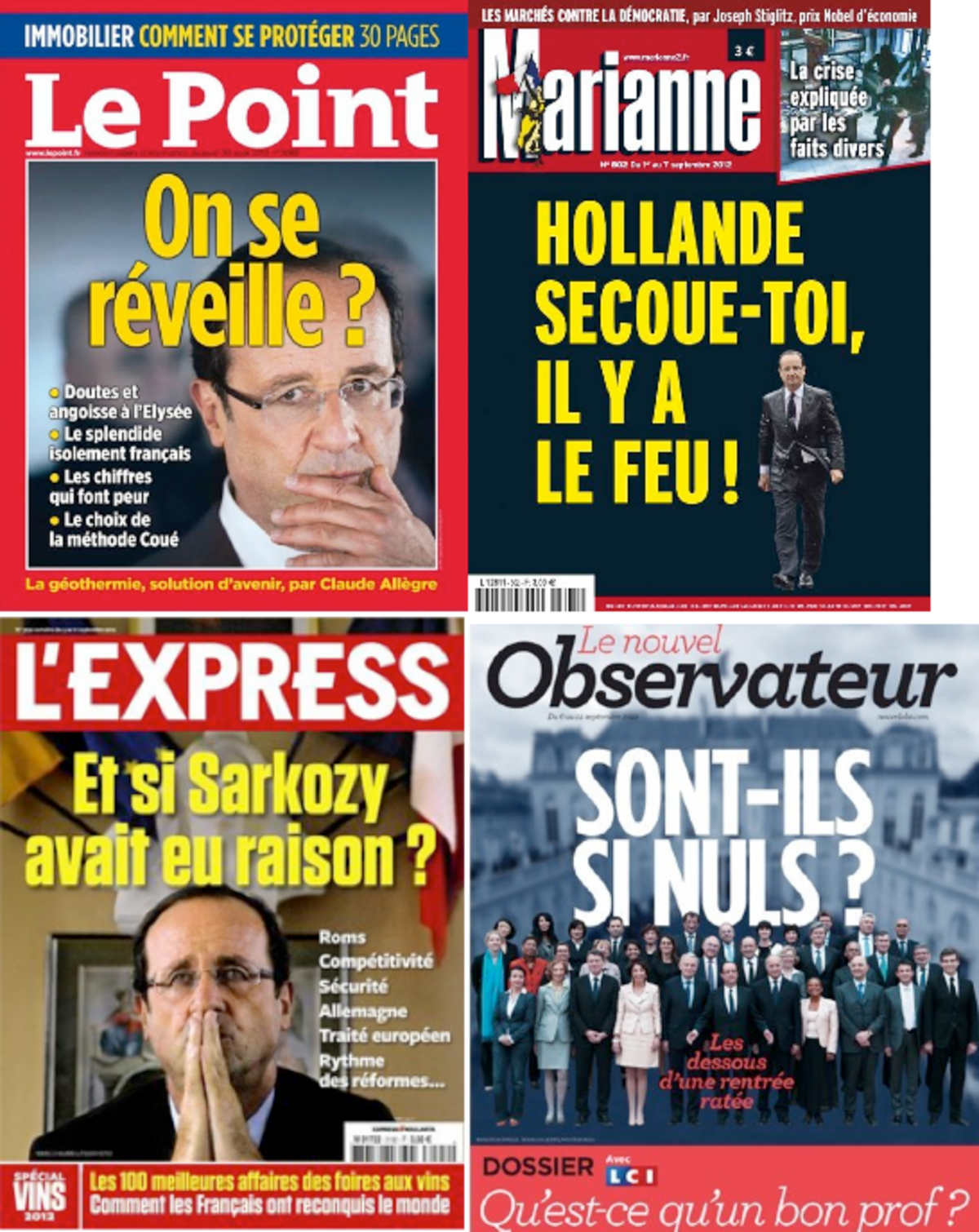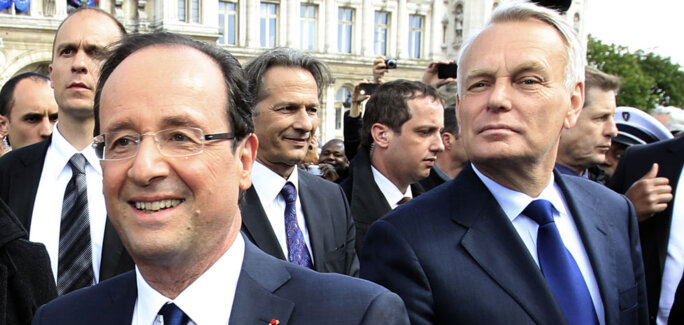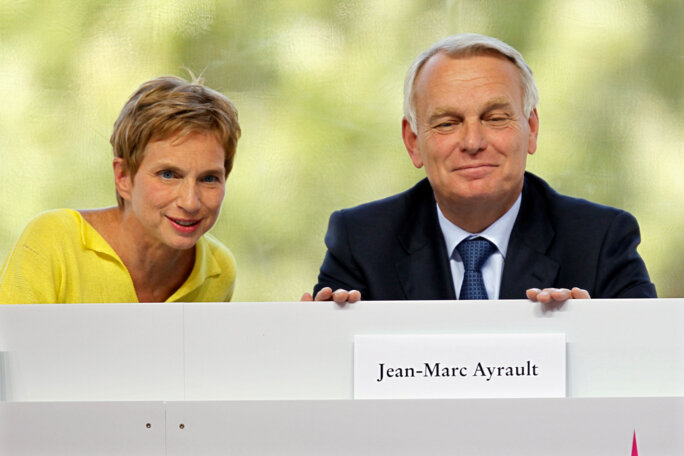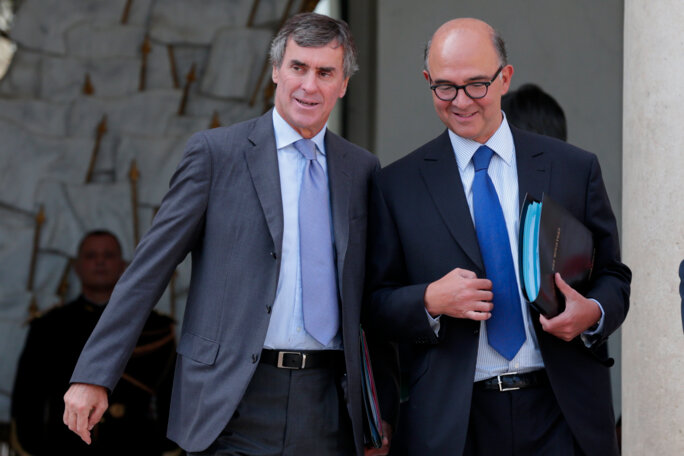French socialist Prime Minister Jean-Marc Ayrault on Friday presented his belt-tightening 2013 budget, designed to provide a deficit reduction of 30 billion euros, which wasmet with criticism from both the austerity-rejecting Left and the anti-rich tax Right.
Following his recent interview with Mediapart, Ayrault prepared the event with a rare and lengthy appearance on French television on Thursday, as much to dispel mounting criticism of his leadership style as to present government policies. "I am tenacious and I never give up," he said, answering questions from journalists during the programme, Des paroles et des actes ('Words and deeds'). "I am the head of a team", he insisted, later adding: "Every government has a rule. We discuss, and afterwards we are united."
For since President François Hollande appointed him as Prime Minister in May, Ayrault, struggling to reach a consensus among his own parliamentary majority, while keen not to alienate the business community, has been slammed for a slowly-slowly approach to decision-making that can’t keep pace with the economic crisis.
Accused equally of authoritarianism and a lack of authority, Ayrault has had a disastrous ride of late in terms of public relations, mirroring President François Hollande, whose opinion poll ratings have been in freefall since the summer. Ayrault, like Hollande, has become the subject of harsh French press headlines, the two men under attack for a perceived lack of presence at the helm in contrast with the previous conservative government's almost frenzied agenda of high-profile policy initiatives.

Enlargement : Illustration 1

‘Are they really such dummies?’ asked the cover headline of left-leaning news weekly Le Nouvel Observateur over a photo of the new socialist government, 'Shape up Hollande, there's a fire on', screamed another left leaning weekly, Marianne, while Le Point pictured Hollande on its cover with the question ‘Shall we wake up?’
Since his appointment as prime minister in May, the priority he has placed in consultations and the reaching of consensus has been seen by some as a dithering approach. "The prime minister wants to appear as a quiet, determined force. He is insisting on the fact that the reforms will come in due time and that they will have meaning," explains André Chaissaigne, a Communist Party MP and chair of the radical-left Front de Gauche parliamentary group in the lower house, the National Assembly, after a recent meeting with Ayrault at his official offices at the Hôtel Matignon.
"Ayrault is asking for time and does not want to act under pressure," says François de Rugy, co-chair of the Green parliamentary group and a former deputy to Ayrault's when the latter was mayor of Nantes between 1989 and 2012. "That has always been his trademark. When he was elected mayor of Nantes he said right off, 'I will probably need two terms.' Obviously, it takes a little time for the benefits to become apparent," he adds.
Yet the facts are there. The administration badly handled the summer break. There were times when it gave the impression that it was hesitating and contradicting itself: there was the controversy over the expulsions of Roma, another over the hesitating on a promised cut in petrol prices and over President François Hollande’s seeming readiness to water down his plan to tax top income earners 75% (which in the end he didn’t), and which is highly symbolic for the Left.
Representatives of the ruling socialist majority are not pulling their punches and some government ministers even had their fits of pique, sometimes reiterating criticism dating back to 1997.
Then, on the heels of Socialist Party leader Lionel Jospin's victory in the 1997 legislative elections, Ayrault became chair of the socialist parliamentary group in the lower house, the National Assembly. Four months later the derogatory comments began? Daily newspaper Libération, reporting at the time on what it called “the Ayrault problem” described him as, variously, “incompetent'”, “bad”, “lacking authority”. One socialist insider cited in the article, after commenting that "he has no stature", added: "Yet he is mayor of Nantes. He must therefore have some abilities. There is an Ayrault mystery." The report noted that a number of MPs had begun calling for a new leader.
Fifteen years later, the parallels are striking. Ayrault's general policy speech of July 3rd was widely considered to be bland. Some MPs already voice their doubts. “To be challenged so quickly! One wonders if he shouldn't be changed quickly,” says one, who asked not to be named. However, despite all the criticism back in 1997, Ayrault went on to remain leader of the Socialist Party parliamentary group for a decade and a half. "He's always been challenged, but has always been re-elected," notes socialist Senator Gaëtan Gorce.
'Ministers stage outbursts to show they exist'
According to several government advisors, a significant early problem is the inexperience of the new team in power. Only five out of the current 38 ministers had previously held a portfolio. Many ministers were surprised by the magnitude of the workload. "This significant 'surprise effect' was amplified by inexperience," according to one long-time civil servant, who spoke on condition of anonymity. "We are making a cold start," explained in August Alain Vidalies, chief-of-staff to the Minister for Parliamentary Relations. "In 2007, [newly-elected president, Nicolas] Sarkozy had already been a minister, certain reforms such as the bill on [tax breaks for overtime pay] was already in the pipeline. Here, the ministers have to settle in, set up their staffs, but also the civil servants have to set aside their dossiers to take up new ones," he adds.

Enlargement : Illustration 2

In the meantime, ministerial bickering peppered the beginning of the term. Minister of Culture Aurélie Filipetti and budget minister Jérôme Cahuzac ripped into each other over advertising on public television. Arnaud Montebourg, Minister of Productive Recovery and Pierre Moscovici, Minister of the Economy, allowed their rivalry to surface at the finance ministry when it was revealed that commercial investment bank Lazard [1] was selected to mentor the creation of the Public Bank for Investment – a conflict that overshadows a true divergence of views over the size and the role of the government's future tool for financing the economy.
Even worse, the prime minister’s authority was sometimes challenged. Christiane Taubira, the Minister of Justice, denounced the “fantasy” of locked juvenile educational centres, despite President Hollande's promise to double their number. Education minister Vincent Peillon beat the prime minister to the punch in announcing a reform in school schedules and in promoting “secular morality” in schools. Not to mention interior minister Manuel Valls, when he saturated the media through the summer with his orders for multiple expulsions of Roma gypsies from their makeshift camps around France.
"We have the impression of a ghostly Matignon, without much influence," says a worried Socialist Party official, who asked not to be named. "As a result, the clever ones or those with ministerial experience are playing their cards. Like Valls, who uses the same media strategy as Nicolas Sarkozy," he adds.
Organising his schedule in order to hog the headlines nearly every day, Sarkozy was dubbed the 'hyper- president'. In contrast, at the end of August, during the Socialist Party’s annual summer conference in La Rochelle, there was talk among participants of a 'hypo-prime minister'. Minister of Social Affairs, Marisol Touraine, said the same thing in so many words to French daily Le Monde. "The central problem is that we no longer have an omnipresent president, but a prime minister who took the model of [previous prime minister François] Fillon. [...] A change of style was required, but also put this change of style into words. That implies a prime minister who finds his role as prime minister," she said.
Several ministers have already begun by-passing Matignon by going straight to the presidential office for a decision on important dossiers. And a mere four months after the election of François Hollande, the tendency of some ministers to play solo is of concern among socialists. "We must not open any ego battles," warns Olivier Dussopt, Socialist Party MP from the Ardèche département (county) in south-centre France. But in times of budgetary restraint, ministers are tempted to stage outbursts to show they exist. "They are asked to act on issues [but] with nearly nothing, like MacGyver," says one MP.
Faced with these flashes of independence, Jean-Marc Ayrault ended up like a teacher scolding his pupils. "That's enough!" he warned them indirectly on radio station France Inter at the end of August. The prime minister has made clear he detests the public airing of divergent views. He also "never backs down on the principle of support for the [ruling] majority," stresses Green MP, François de Rugy. Regarding the European Union ‘fiscal compact’ treaty, the TSCG, the prime minister has spent several weeks calling for unanimous support from his majority – and most certainly in vain. "He is confusing authority with authoritarianism," complains one MP.
"It's a strategy of tension that I do not understand," says Socialist Party MP Jérôme Guedj, member of a left-wing movement in the party. "It mostly resembles an admission of weakness," he adds. The prime minister’s office dismisses the criticism. "What’s at stake is the whole strategy for the reorientation of Europe,” says a Matignon advisor. “Not to mention that with a divided [parliamentary] majority, François Hollande runs a risk of [ridicule] at the next European Council on October 17th.
Ayrault advisor admits 'we had a poor campaign'
Ayrault has also been hit by a series of communications mishaps that gave an impression of indecision. On divisions over nuclear power and on the Roma, for example, the PM was slow in calling a halt to the sniping. More importantly, the July parliamentary session, and notably the budget bill, were poorly presented. "We lost the communications battle," admits an Ayrault ally, speaking on condition of anonymity.
The conservative opposition was able to organise a parliamentary response by focusing on the bill to remove tax breaks on overtime pay. Meanwhile, the government gave the impression that it was interested only in achieving fiscal discipline. "Who knows that we passed a tax on oil companies or on dividends?” laments a minister. “We only touted the angle of 7 billion [euros] in savings, while there were at least six measures that were truly leftist."
The president has, in fact, expressed concern over this lack of clarity in the government's action. In July, during a cabinet meeting, the Minister for Parliamentary Relations, Alain Vidalies, explained that if, rather than presenting the budget as a single package, it had been cut up into six bills, this would have avoided criticism. Hollande's dry response was: “That might have been a good idea.”
The same holds for the autumn session. At the end of June, both the president and the PMabandoned the idea of calling a special session immediately after the holidays, pushing instead to the last week in September the introduction of the autumn's session first bills. These plans were turned topsy-turvy at the end of August. The president, alarmed by poor opinion poll ratings and catastrophic unemployment figures, disrupted the agenda and decided to summon the MPs as of September 10th. "It was decided on August 20th, on the eve of the post-holiday cabinet meeting," says a Hollande advisor. "It was the president's wish to speed things up, but we forgot to sell it afterwards. As a result, we gave the impression of submitting to something that nonetheless we had wanted," he adds.

Enlargement : Illustration 4

The subtext gives the impression that beyond the mishaps of rookies, the ruling team is suffering from a lack of political vision. "Ayrault disappears over the summer, then it's decided to put him back centre stage, and there he goes messing up in the media,” complains a minister's advisor. “Then he goes to the [summer congress of the French business federation] MEDEF. In three months, he's no longer speaking to the Left, it's a first!"
One advisor to the prime minister’s office admitted: "We had a poor campaign. The positions and strategies were not defined on many subjects that we rather had a tendency to fudge on. As a result we sometimes didn't have a line.”
For a while now, the weight of the so-called 'technos', or bureaucrats, whose aversion to risk is legendary, has concerned a number of ministerial advisors, who say that Sarkozy's overhaul of the public sector picked the civil service to the bone. Common complaints are that there is no more fat allowing civil servants out of the daily grind, that there are too many technocrats', and just about only that.
'Hollande and Ayrault are men of consensus'
Economy minister Pierre Moscovici and his junior in the budget ministry, Jérôme Cahuzac, have reputations for being viscerally attached to fiscal discipline. "During the debate over the budget bill, Cahuzac only talked about the savings achieved. But he couldn't say anything else because he was against some of the measures," one minister notes.
"When you mention a Hollande campaign promise to him, Cahuzac raises his eyes to the ceiling and responds: 'He's already made so many!'" says another minister.

Enlargement : Illustration 5

Examples of the finance ministry's political restraint are already legion. The Minister of Finance put out a memo on the European crisis "without a word about [finance] speculation," complains a Hollande advisor, also speaking on condition of anonymity. For a while, the ministry even blocked the allocation of grants, approved in July, for students studying abroad, although it was a Hollande campaign promise. It was only under pressure from MPs representing the French expatriate constituencies that the grants were freed up.
These fundamental disagreements largely explain the quarrels between Moscovici and Montebourg, but also between Montebourg and the prime minister. Before the summer, the Minister of Productive Recovery bypassed Jean-Marc Ayrault several times to ask for support from the presidential office, seen by some ministers as 'more to the Left', or at least, less cautious, than Matignon. "At the cabinet meetings, frankly, the farthest Left is often Hollande," says one minister. "I sometimes feel like I'm a left-wing minister in a centre-right government," says another.
This lack of political risk-taking, perhaps even of a strong vision, is also what concerns MPs from the left-wing of the Socialist Party, from the Greens, and from the radical-left Front de Gauche. "When we talk with Jean-Marc Ayrault, he promises that he will not deviate from the campaign platform," says André Chaissaigne of the Communist Party, a member of the Front de Gauche. "He swears that he made no concessions in his speech to the MEDEF and he says that he told [LVMH luxury goods group CEO] Bernard Arnault that the wealthy should make more sacrifices...But the landing is a little different," he adds.
The difference between Ayrault and Hollande is nuanced. Both have always defended the need for consensus among the Socialist Party, asserting a central position within their party and making political caution a primary virtue. During the campaign, Hollande always managed his image as a social-democrat committed to social dialogue, but committed also to fiscal discipline; tied to the renewal of institutions, but not to a total overhaul. Tied to a transition towards more ecological initiatives, but without giving up nuclear power.
"The Ayrault-Hollande method is being tested," says François de Rugy, co-chair of the Green parliamentary group, adding, "They are both men of consensus, permanently seeking a subtle balance between all positions." The danger for both is that is that this can be seen as blandness. Or a renunciation of electoral promises.
-------------------------
English Version: Patricia Brett
(Editing by Graham Tearse)


